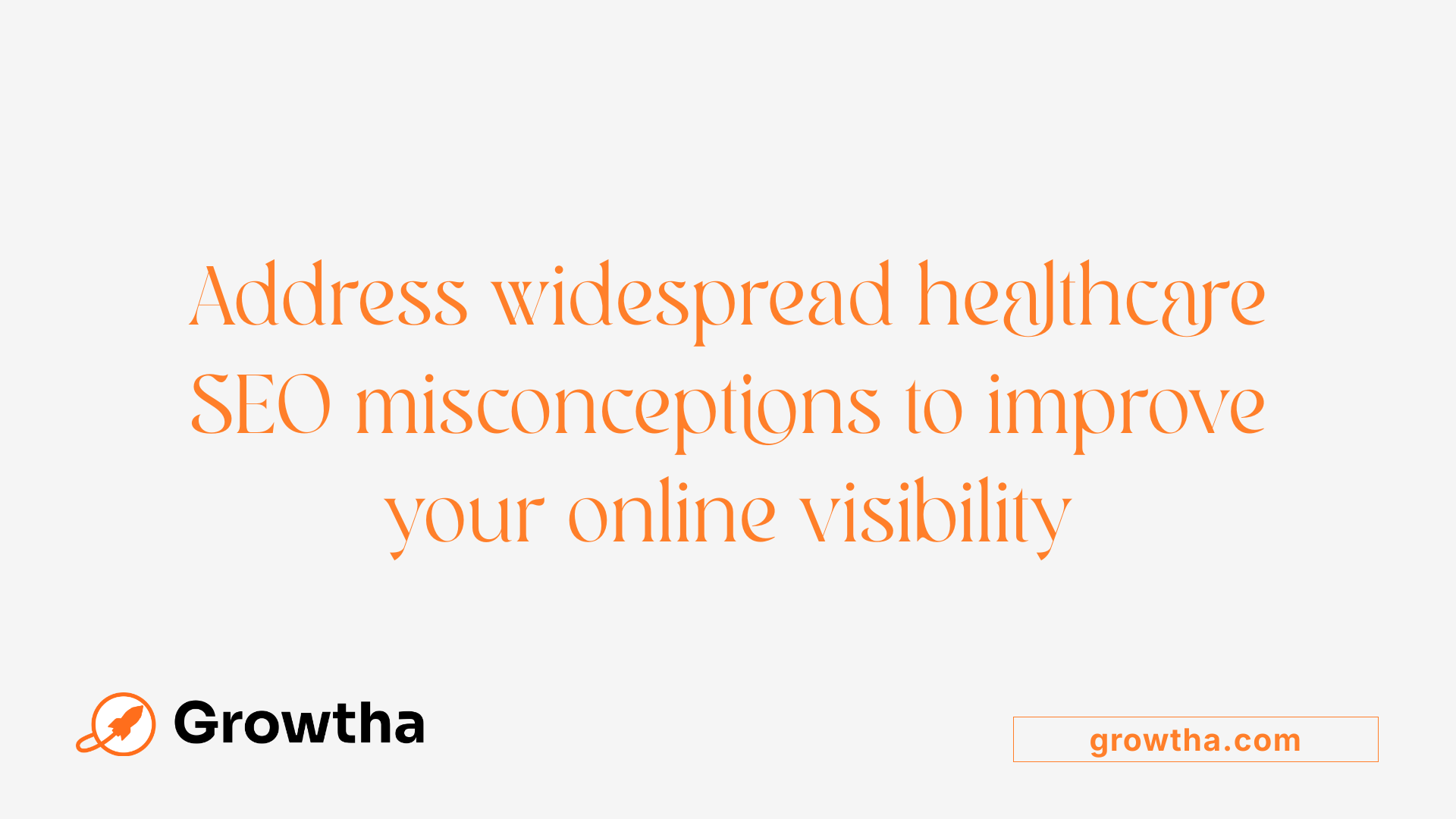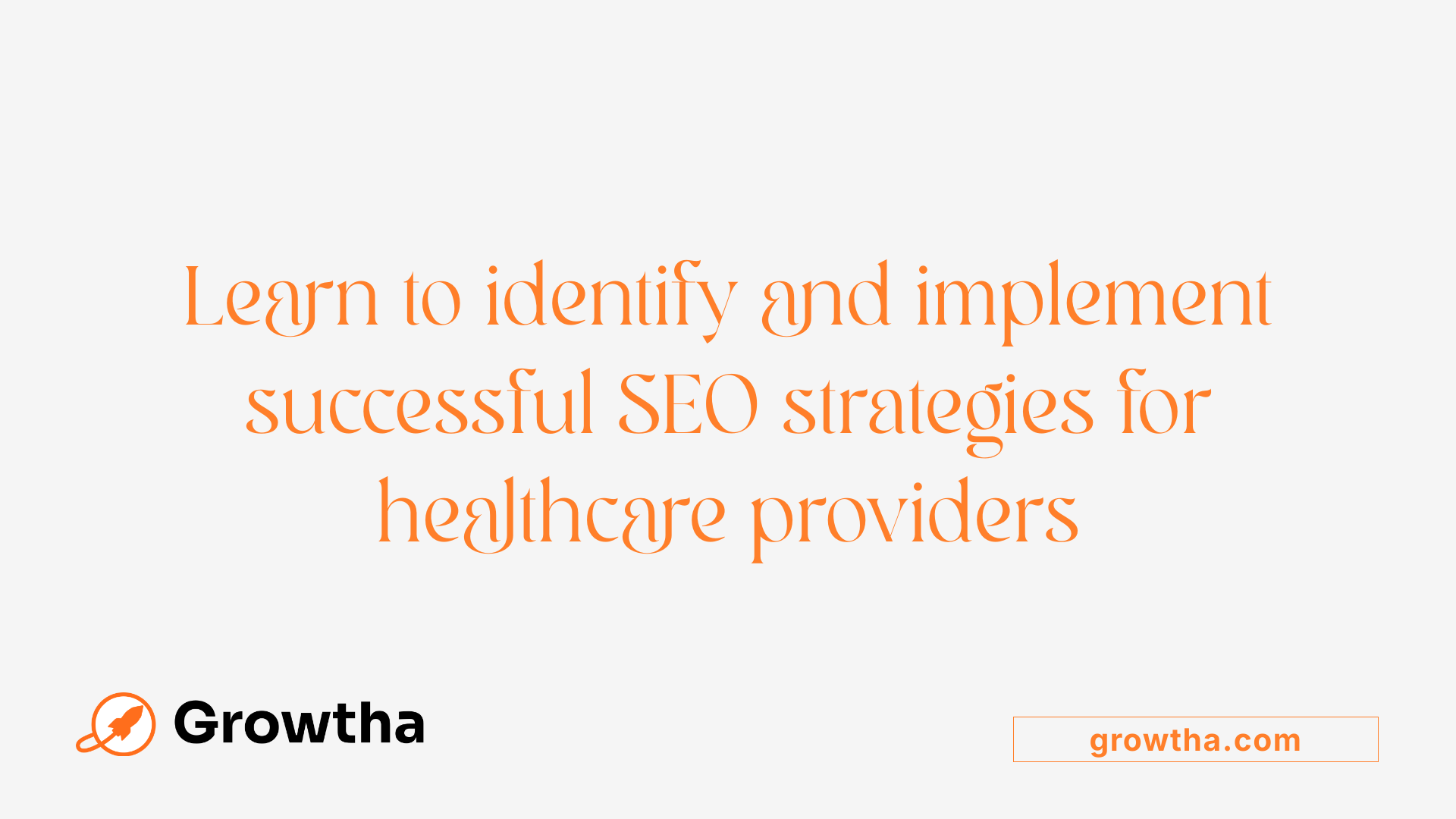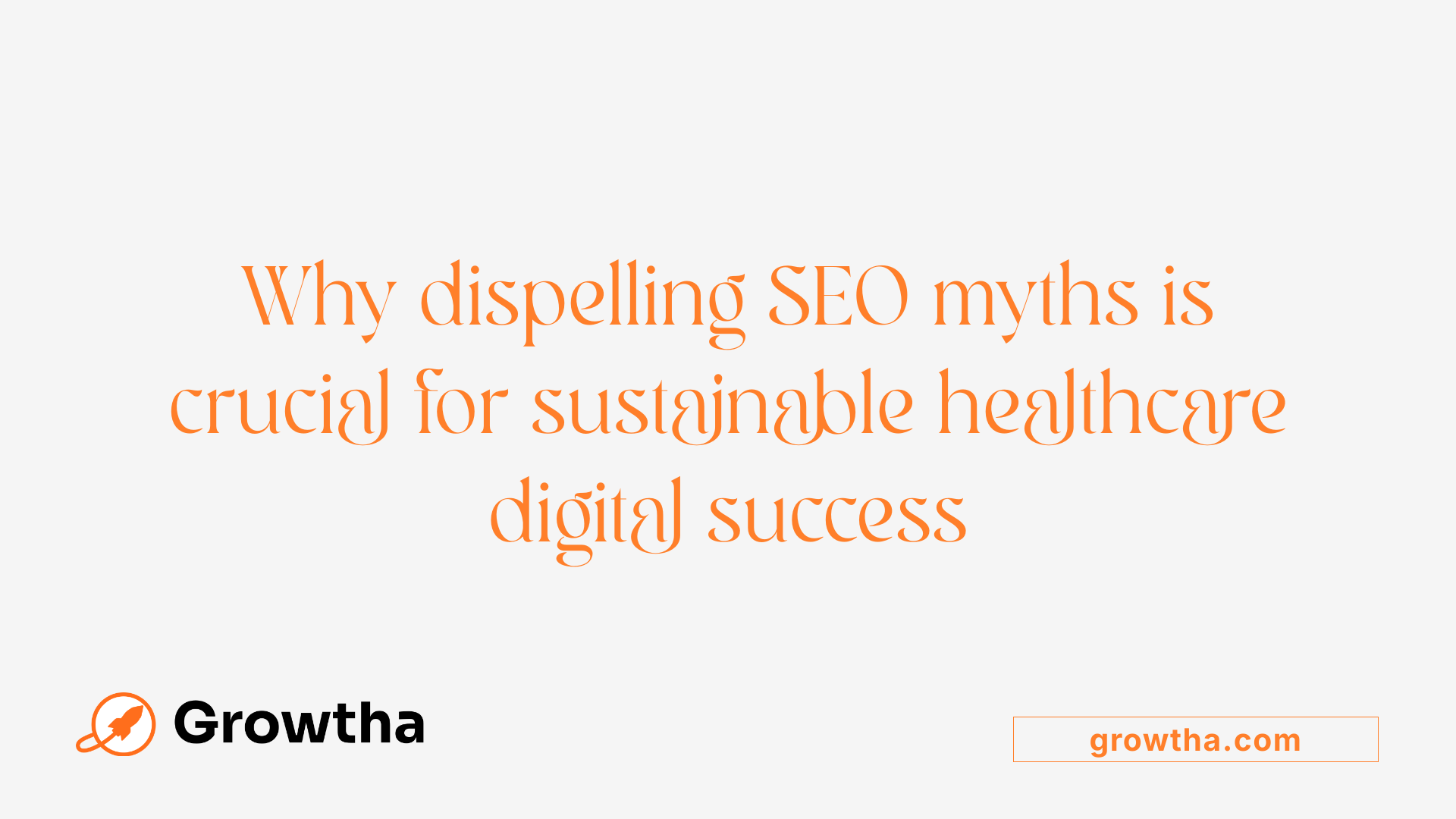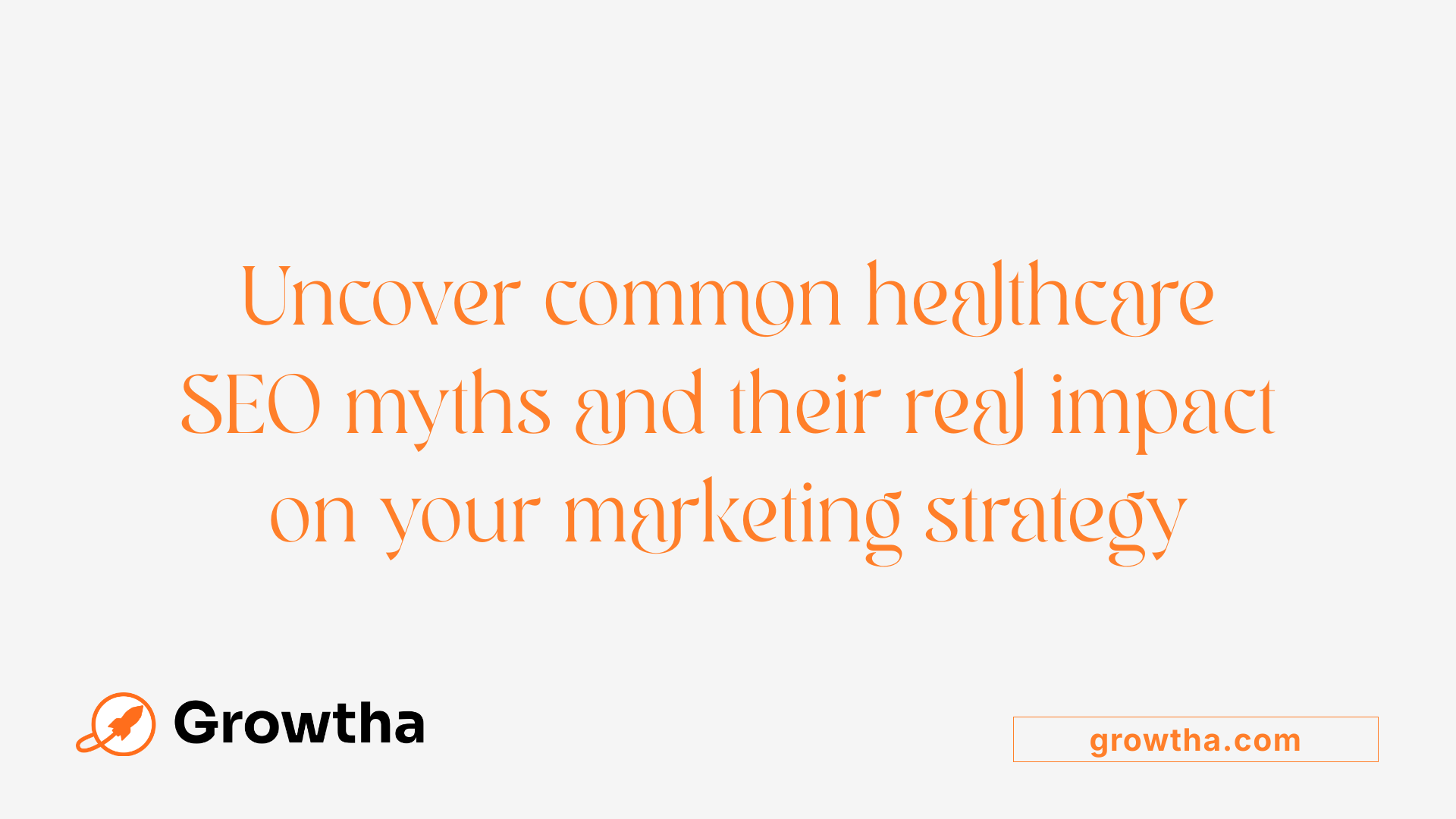Biggest Myths About Healthcare SEO
Unveiling the Truths and Lies of Healthcare SEO


Biggest Myths About Healthcare SEO
Understanding Healthcare SEO Myths to Optimize Your Digital Strategy
In the rapidly evolving world of healthcare marketing, SEO remains a critical element for attracting and engaging patients online. However, numerous misconceptions cloud the path to effective digital visibility. This article aims to demystify the biggest myths about healthcare SEO, offering clarity on what strategies truly work and how healthcare providers can leverage SEO ethically and effectively to grow their practice.
Common misconceptions surrounding healthcare SEO and their implications

What are some common misconceptions about healthcare SEO?
Many healthcare organizations fall prey to various myths that can hinder their online visibility and patient engagement. One widespread misconception is that keyword stuffing or maximizing content quantity automatically boosts search engine rankings. In reality, search engines favor high-quality, relevant content that integrates keywords naturally. Overloading pages with keywords can harm credibility and result in penalties.
Another false belief is that SEO provides instant results. In truth, effective healthcare SEO is a long-term strategy that often takes more than six to twelve months to produce measurable outcomes. Patience and ongoing optimization are essential.
Some assume that the age of a website's domain or the presence of duplicate content on multiple pages has a significant impact on rankings. However, search engines prioritize fresh, valuable content and recognize canonical URLs to prevent duplicate content issues. A newer, well-optimized site can outperform an older, poorly maintained one.
The myth that ranking #1 on search engine results is crucial for success persists but is misleading. Appearing on the first page, particularly within the top 10 positions, is usually sufficient to attract meaningful traffic. Targeting relevant local keywords and providing important information to nearby patients often yields better conversion than striving for the top spot.
Finally, many believe that quick SEO tricks or shortcuts can dramatically improve rankings overnight. Sustainable success depends on consistent effort, including keyword research, website technical health, local SEO, content marketing, and reputation management. Relying on shortcuts can lead to penalties or short-lived gains and may damage brand trust.
Distinguishing effective from ineffective healthcare SEO practices

How can healthcare providers differentiate between effective and ineffective SEO practices?
Healthcare providers aiming to optimize their online presence need to understand what constitutes successful SEO versus practices that can harm their reputation and visibility.
Effective SEO strategies are built around creating a sustainable, long-term foundation. This includes developing high-quality, relevant content tailored to patient needs and ensuring the website is optimized for local search. Local SEO is especially vital for healthcare providers, as it helps attract nearby patients actively seeking healthcare services.
A critical component of good SEO is thorough keyword research. Providers should use tools like Google Keyword Planner, SEMrush, or Ahrefs to identify relevant search terms that their target audience uses. These keywords should be naturally integrated into website content, titles, headings, and meta descriptions.
On-page optimization further enhances search engine discoverability. Unique page titles, descriptive meta tags, clear headers, and schema markup improve relevance and readability for both users and bots. Additionally, website speed, mobile responsiveness, and secure encryption (HTTPS) are must-have technical elements that impact rankings.
Building reputable backlinks from high-authority sources signals credibility to search engines. Content marketing, including blogs, patient education articles, and community engagement, supports natural link generation and authority building.
Conversely, ineffective or harmful tactics, often called 'black-hat SEO,' undermine these efforts. These include keyword stuffing, duplicate or low-quality content, buying links, and manipulative practices that violate search engine guidelines. Engaging in such tactics risks penalties, significantly reducing search visibility.
Regular updates and performance monitoring are essential. Using analytics tools helps providers assess traffic quality, user engagement, and conversion metrics like form submissions or appointment bookings. Quick wins like social media activity and review management also boost local relevance and trust.
Neglecting core areas or participating in manipulative tactics can lead to lower rankings, loss of credibility, and diminished patient trust. Effective healthcare SEO requires a careful balance of strategic planning, ethical optimization, and ongoing adjustments.
In summary, distinguishing effective practices involves focusing on delivering value through quality content and technical excellence, emphasizing local relevance, building authority authentically, and adhering to search engine rules. Providers should stay informed about algorithm updates and evolving best practices to maintain and improve their online visibility.
Key strategies for successful healthcare content marketing

What are the key strategies for successful healthcare content marketing?
Effective healthcare content marketing revolves around a well-planned approach that emphasizes accuracy, patient-centricity, and strategic distribution. First, developing a structured content plan that aligns with the organization’s overall goals is essential. This plan should focus on addressing patient needs through truthful, clear, and accessible information, reinforcing trust and credibility.
Understanding the target audience is crucial. Healthcare organizations must analyze demographics, preferences, and common concerns to tailor content appropriately. Different formats—such as articles, videos, infographics, and patient stories—can help engage diverse audiences effectively.
Aligning content with organizational objectives and setting SMART goals (Specific, Measurable, Achievable, Relevant, Time-bound) ensures focused efforts. Choosing the right distribution channels—like social media platforms, the healthcare website, email campaigns, and community forums—further amplifies reach.
Implementing search engine optimization (SEO) best practices is vital. Proper keyword research, relevant meta tags, and schema markup improve visibility in search results. User experience factors such as mobile responsiveness, fast-loading pages, and easy navigation increase engagement and reduce bounce rates.
Consistency is another cornerstone. Regular publishing of high-quality content builds trust over time and improves recognition among patients and search engines alike. Monitoring performance through analytics tools enables ongoing refinement. Metrics like page views, engagement rates, and conversions reveal what resonates and where adjustments are needed.
Compliance with healthcare regulations such as HIPAA or GDPR is mandatory. Ethical standards—transparency, honesty, and prioritization of patient interests—must guide content creation, avoiding misleading or overly promotional messages.
Collaborating with healthcare professionals or content specialists boosts authority and accuracy. This multidisciplinary approach ensures content remains factual and trustworthy.
In summary, a successful healthcare content marketing strategy integrates careful planning, audience understanding, SEO, consistent content efforts, and adherence to ethical standards. This holistic approach enhances online visibility, builds patient trust, and ultimately supports organizational growth.
The importance of debunking healthcare SEO myths

Why is it important to debunk myths about healthcare SEO?
Healthcare organizations often encounter misconceptions about search engine optimization (SEO) that can impede their digital marketing success. These myths foster false expectations and misallocation of resources, potentially leading to wasted efforts or even penalties from search engines.
One common misconception is that increasing website traffic automatically translates into more patients. However, targeted and qualified traffic—especially from local searches—is more likely to convert into actual appointments. Merely attracting high visitor numbers without relevance or intent can be ineffective.
Another prevalent myth is that ranking #1 in search results is a necessity for success. While higher rankings can boost visibility, appearing within the first page—positions 1 through 10—is generally sufficient to attract attention and generate traffic. The exact position within this range often matters less than being visible prominently.
Many believe SEO is a one-time task or short-term effort, but in reality, it demands ongoing management, updates, and refinement. Search engine algorithms continuously evolve, requiring healthcare providers to monitor and adapt their strategies regularly.
Disproving these myths is essential for developing realistic, sustainable, and compliant SEO practices. Accurate understanding helps healthcare providers invest wisely, focus on local and high-quality content, and remain patient as results materialize over time. Clarifying these false beliefs promotes strategies that truly foster long-term patient engagement and trust.
Impact of misconceptions on healthcare marketing and solutions

How do misconceptions impact healthcare marketing strategies?
Many healthcare organizations operate under false beliefs about marketing, which can significantly hamper their growth and patient engagement efforts. For instance, some believe SEO and digital marketing are quick fixes that deliver immediate results, ignoring the fact that SEO is a long-term investment often taking over 5-7 months to show meaningful outcomes.
Others assume that simply increasing website traffic equates to more patients, neglecting the importance of attracting qualified, local visitors who are genuinely seeking healthcare services. This misunderstanding can lead to misallocation of resources on broad, non-targeted campaigns instead of focused local SEO efforts, content quality, and reputation management.
Additionally, misconceptions about the ethics of healthcare marketing—such as the idea that promotion is inherently unethical—can prevent providers from establishing a necessary digital presence. This absence can hinder transparency, trust, and patient decision-making.
Recognizing the reality that effective healthcare marketing involves strategic planning, ongoing efforts, and ethical practices is essential. It encourages organizations to prioritize quality content, local SEO, reviews, social media engagement, and continuous optimization, ultimately fostering trust and attracting more local patients. Correcting these myths equips healthcare providers to develop sustainable strategies that meet both ethical standards and business goals.
Factual knowledge and ethical practices in healthcare SEO

What is the role of factual knowledge in healthcare SEO?
Factual knowledge is at the core of effective healthcare SEO. It ensures that all website content, whether on service pages, blogs, or patient resources, is accurate, credible, and trustworthy. This kind of content is essential for guiding patients toward informed health decisions, which can significantly impact their trust and engagement.
Developing and maintaining factually correct content helps healthcare organizations establish themselves as authoritative sources. It demonstrates expertise and enhances visibility in search engine rankings, particularly under Google's E-A-T (Experience, Expertise, Authority, Trustworthiness) guidelines.
In addition to boosting rankings, factual information ensures compliance with legal and regulatory standards such as HIPAA in the U.S. and FDA regulations. These laws require that healthcare providers handle patient data with confidentiality and that claims made about treatments or products are truthful and supported by evidence. Misinformation or inaccuracies can lead to legal repercussions and damage a provider’s reputation.
High-quality, evidence-based content also improves patient trust. When users find reliable information on a website, they are more likely to choose that provider for their healthcare needs. This trust-building is crucial in a field where misinformation can have serious health consequences.
Moreover, factual knowledge supports search engine optimization by enhancing content relevance and engagement metrics, such as time on page and bounce rate. Search engines favor well-researched content that adds real value, helping to improve organic rankings, especially in local searches where proximity and trust influence patient choice.
Building a solid foundation of confirmed, credible information is therefore vital. It aligns with ethical healthcare practices, safeguards the organization from legal issues, and ultimately helps attract and retain patients. For healthcare providers, the goal is not just to rank high but to provide honest, reliable information that meets patients' needs and respects their trust.
In summary, factual knowledge plays a crucial role in healthcare SEO by ensuring accuracy, supporting compliance, building trust, and enhancing visibility. It underpins a responsible digital presence that benefits both patients and the organization, making it an indispensable component of ethical and effective healthcare marketing strategies.
Moving Forward: Building a Realistic and Effective Healthcare SEO Strategy
Debunking healthcare SEO myths is not just about correcting misinformation; it’s about laying the foundation for successful, compliant, and patient-centric digital strategies. Healthcare providers must recognize that SEO is a long-term, ongoing effort that requires expertise, quality content, local relevance, and continuous optimization. Dispelling myths about quick fixes, immediate results, or shortcuts empowers practices to allocate resources wisely, avoid penalties, and ultimately build trust with their patients. Staying informed through reputable sources, embracing ethical practices, and focusing on factual, high-quality content will pave the way for sustained growth and online visibility. As the landscape evolves, a clear understanding grounded in facts will ensure healthcare organizations harness the full potential of SEO in delivering value to their communities.
References
- Busting Healthcare SEO Myths: Navigating Fact from Fiction
- 5 Medical SEO Myths: Buyer Beware - RUNNER Agency
- Debunking the Biggest Myths in Healthcare Marketing
- Debunking Myths About Healthcare and Pharma SEO
- Debunk Healthcare Marketing Myths With UNCP's Online MBA
- Mastering Healthcare Content Marketing: 8 Common Myths Debunked
- 8 Medical SEO Myths Healthcare Providers Should Know About







